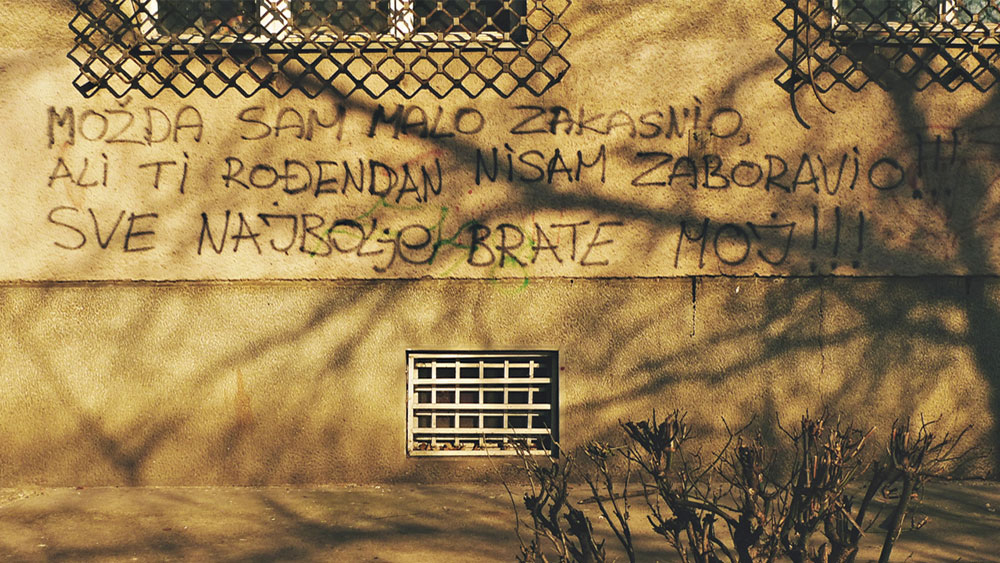
I might be a little late, but I didn’t forget your birthday!!! All the best, my brother!!!,
user’s photos: Predrag Trokicić
Wait a minute! What are we actually celebrating on January 9th? All those stories about who will march, and who will sing what, have caused us to forget the essence. And the essence is the answer to the question about what actually happened on January 9th, 1992. Because this date was chosen as the “Republic’s birthday”. I said chosen, because celebration dates are chosen based on political decisions about the ideas and values represented by those dates and the messages which will be repeated annually “for generations to come”.
In his outstanding article published in Vreme, Dejan Anastasijevic reminded us that, on that day in 1992, Serbian members of parliament, led by Radovan Karadzic, left the BiH parliament in Sarajevo, went to Pale and there proclaimed the founding of the “Serbian republic of BiH”.
What does it mean to celebrate this date today? To answer this question, we need to call upon what may seem like an uninspiring secondary historical science – chronology. It may be boring or unimaginative, but, very often, the sequence of events reveals the essence in the most simple and obvious way. An essence which may get lost in the sea of controversial information which marked the beginning of the war.
So, if we say that RS was founded on January 9th, then we are saying that on that day this new entity was established on the territory of the previous republic – Bosnia and Herzegovina. This means admitting that this was an act of separatism, that RS separated from BiH, and that, by that act, BiH in its previous form ceased to exist. Let me just remind you that in January 1992 the referendum on independence of BiH was not yet organized, there was no recommendation by the European community to acknowledge the independence of BiH and only the gravest pessimists expected the war. In other words, by celebrating January 9th, Banja Luka officials are solving the chicken-or-egg issue. So: RS was established first and then, in April, the war started.
This is an interesting chronology, because it is usually considered that RS was created “on territories watered with blood and built on bones”, as patriarch Irinej said. This means that it was created as a CONSEQUENCE of the war. So, according to this mainstream narrative “the war struck” (just like that, as if it was a storm or some other natural disaster) and forged the new republic. According to that chronology, the founding of RS was completely defensive – established to protect the Serbs from the “coming genocide”.
This has brought us to the essence of the problem. Because, if we translated this mainstream narrative into chronology, we could find much better dates for RS’s birthday than January 9th. It could be celebrated on any date after April 6th, when the war in BiH started. Only in this chronology, the myth of RS as a result of the war and its defensive attributes could be true.
This situation with January 9th being celebrated as the day of the foundation of RS sets a completely opposite sequence of events and completely different chronology. Because, if the separation of RS preceded the war, it couldn’t have been its CONSEQUENCE. On the contrary, establishment of RS becomes its CAUSE. By choosing this date, RS officials have accepted the chronology which is completely contrary to their own understanding of the BiH war. We don’t know whether they debated on chronology or how they chose this date. What were the arguments in favor of this date? It seems to me that what we’re dealing with here is lapsus memoriae, an oversight in memory and thought which, like all other oversights, is revealed unconsciously. By celebrating January 9th, RS leaders are admitting to what they were always trying to deny: that the cause of the BiH war was separatism of Serbian leaders, because, without a war, a new state couldn’t have become truly separate from BiH, its boundaries couldn’t have been set, nor could it be ethnically clean as they wanted it and as it is today.
By celebrating January 9th, Republika Srpska leadership has established a chronology which reveals the essence. This chronological lapse happened and now, especially since it was confirmed on the referendum, it has formalized the sequence of events painting the full picture of the war in Bosnia and its causes which was previously denied. So, I suggest we accept January 9th, if anything, as the first, though still unconscious step towards the recognition of responsibility for everything that occurred afterwards.
Translated by Marijana Simic
Peščanik.net, 19.01.2017.
- Biografija
- Latest Posts
Latest posts by Dubravka Stojanović (see all)
- Posthumni život Ustava iz 1974. - 23/02/2024
- Prošlost dolazi - 30/11/2023
- Prošlost dolazi, 2. deo - 24/11/2023


